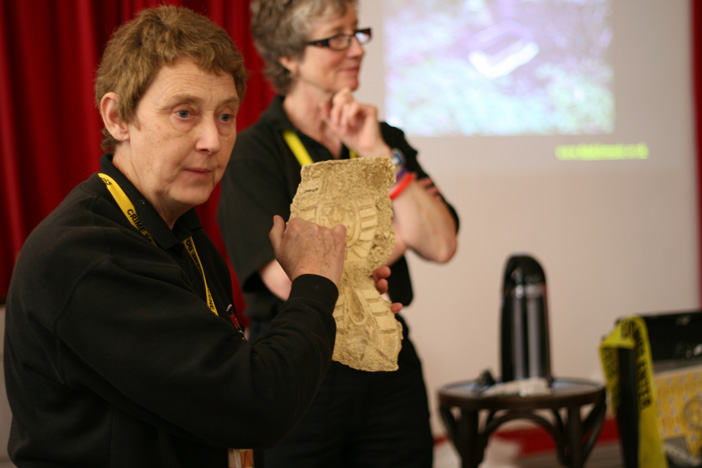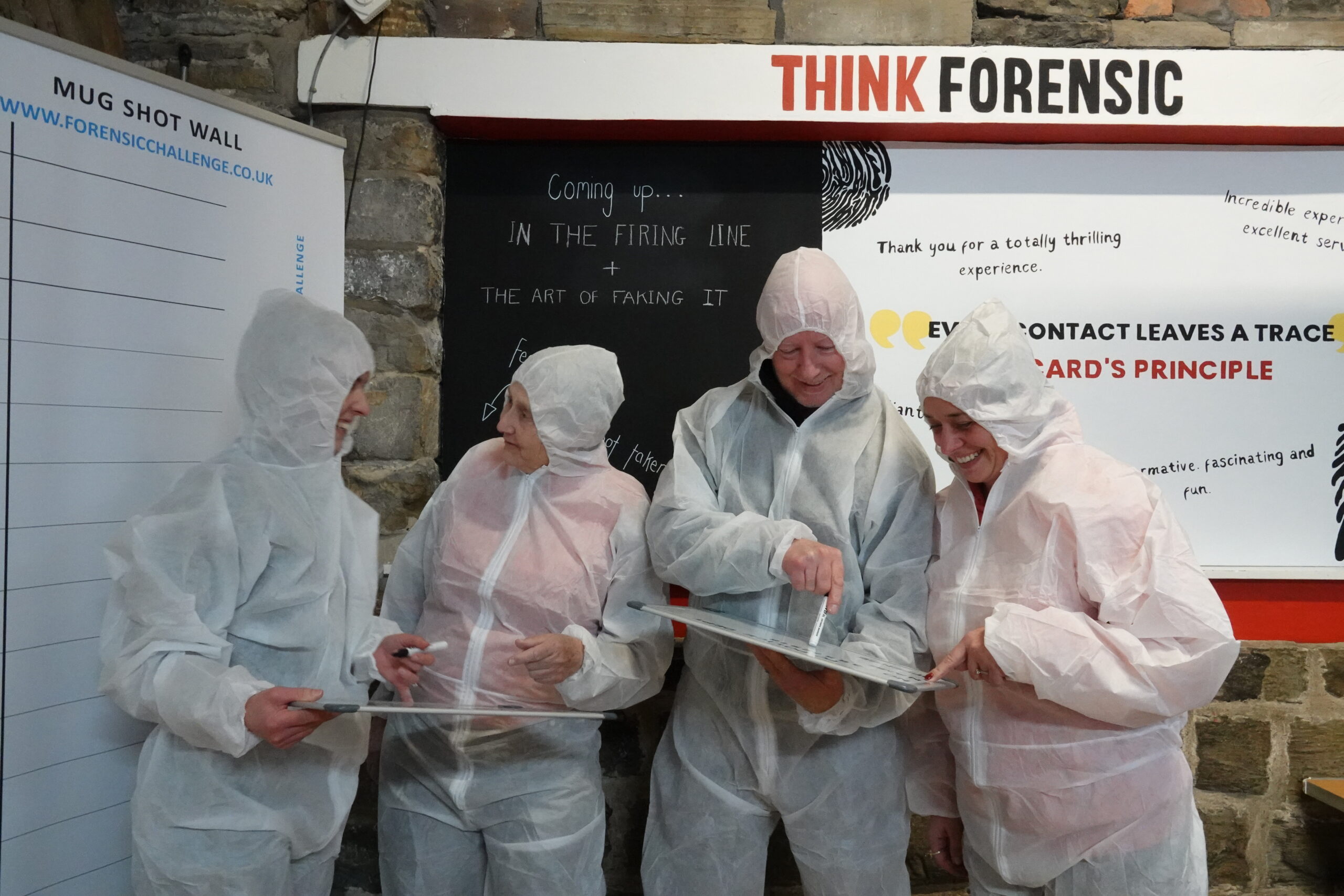Getting to know our founder, Sue.
Think Forensic couldn’t be owned by a more formidable, committed and kind-hearted person.
The company has a rich history, all of which has stemmed from Sue’s background in policing.
We managed to pin Sue down and ask her just a few questions about her experience and time in the force.


Sue was a part of West and South Yorkshire police for over 30 years. Joining as a cadet at the age of 17 in 1971 and retiring in 2003.
So, Sue, can you name three career highlights, big or small, that you remember to this day.
• Meeting Princess Anne, no matter what you think of royalty she is one of the hardest working people and I have a lot of time and respect for her.
• Development work at the Youth Offending Team, it led to producing a film and interactive CD Rom around the consequences of car crime. Both the film and CD Rom was used nationally by many organisations.
• Being in driver training, I enjoyed every minute of it particularly the specialist courses such as anti-hijack, VIP and TPac.
What led you to join the police force?
I wanted primarily to help people, it’s as simple as that.
Nowadays when I’m in school I ask the students why they think I joined the police service and horrifically they invariably say “to lock people up“, I point out to them that for every person arrested we are helping solve a crime or protecting someone.
Were female police officers as widely seen when you were a new recruit as they are now?
Not at all. It was a different role altogether back in the 70’s. Female officers joined as policewomen and dealt primarily with offences involving females including offences of indecency and assault. It was a policewoman’s department and we worked separate beats and shifts etc to our male colleagues. There was only a handful of women compared to the number of male officers.
What have been the most surreal moments in your career?
Oh there’s been many! From arresting the same person five times in one week to someone running me over on the moors in the middle of nowhere.
Which specialisms/elements of the job did you find yourself most excited by?
In the police service everyday is different. You never know what’s going to happen or what you are going into, that can be exciting but it can also get the adrenalin pumping.
I really enjoyed my time in driver training obviously part of the job was to raise the standard of driving but also to help police officers learn to control the adrenalin.
What was the least glamorous or most tedius part of the job?
For me, it’s the paperwork. I don’t like paperwork at the best of times, but I hated it in the force, even though I knew it was necessary.
How easy was it to move around and gain a wide range of experience in different areas of the force?
For me at least, initially it was difficult for a woman to get into male dominated areas and to become accepted. I think over, what is relatively a short period of time, things have changed drastically and that is down to women proving they can apply themselves to specific roles. I remember being laughed at when I first applied for road traffic.
How did working with young people as part of your time in the force, shape the way you built Think Forensic?
Working with young people actually created Think Forensic. I was involved in delivering a road safety programme in schools and part of that programme included looking at evidence found in a crashed vehicle including fingerprints and DNA etc. The science teachers found that part of the programme really motivated their students and asked if we could run a workshop for them based on forensics. We did and hence Think Forensic was born.
Was it always your intention to ensure that Think Forensic caters for all audiences?
Not at all actually! We initially started with secondary school workshops. This developed to all ages and now we work in nursery, primary, 6th form, colleges and universities too. We have a 3 tier system depending on a schools budget. Teachers can either download worksheets from our website, buy our kits and run sessions themselves or have us in. It wasn’t long before we realised adults had a huge appetite for the topic too. So we built our crime centre and now run events for members of the public. In the centre we have various crime scenes set up, we have a blood spatter room and a blood spatter head, we have a burnt out fire room and a car inside too. We run 5 different adult events and sell tickets through Virgin Experience Days, Buy a Gift.com, Uniquely Local and about another 4 experience companies.
In addition to those we run corporate events, marketing promotions and consult with authors, playwrights and actors.
Did you ever imagine the distances people would travel to attend Experience Days?
No I didn’t! Our Crime Scene Centre is in Huddersfield, West Yorkshire and we regularly get people coming from Scotland, the South Coast, Wales and Ireland. I think the furthest we have had is Singapore.
How do you source such a strong team and what are the similarities between the Think Forensic team and those in the police service?
We have people from all sorts of police and crime investigation backgrounds, plus fire officers, forensic experts including scientists, geographic profiler and linguists. Very often we get a police officer coming along and saying they don’t have the skills to join us but they honestly do. The job (no matter what department they have or have not been in is enough experience in itself). We can give them the forensic knowledge they need, but their experience can’t be substituted and makes them an integral part of our business.
Why do you think it’s so important for those who may have retired to be offered to get involved in the work Think Forensic does?
The flexibility is great for many people. We offer all our team the opportunity to opt in or opt out when they want. We send out dates when we require staff and they reply with the dates they want to do. It’s ideal for retired officers as they can still look after the grandkids or trip off on a cruise when they want but it keeps their hand in and gives them an interest outside friends and family. It’s also a little top up to their pension.
What do you think it is about Think Forensic that makes it so valuable to both staff and customers alike?
For us, its important to have ex police officers involved, it gives credibility to our programmes and the company. People attending events want to speak to people who have been there and worn the T-shirt. They love the stories about cases and jobs that we’ve dealt with. As police officers very often we deal with negativity i.e. people who have no respect for the law etc. The public we get coming along want to be here and want to talk to us, their enthusiasm is refreshing and at first even alien.
Weekend events are for the general public, do you find that the audience tend to have the same type of backgrounds and interests?
It’s extremely varied actually. We have people who watch crime programmes on TV or read about it in books, other people are authors stiving to make their plots as accurate as possible, we get people thinking about careers or career changes plus we get people from all sorts of academic backgrounds and abilities. The best part about it is they actually want to be with us and engage with us.
What do you miss most since having retired from the force?
I think if I hadn’t have started Think Forensic I would have missed the comradery of being part of the service but we still have that within the company. I am so proud of our staff they are a team and are a brilliant group of people.
Do you miss the responsiblilty that the role brought?
Not now, I think I have enough responsibility here. Running a business is a very steep learning curve. This is a new and different challenge, don’t get me wrong I’ve made loads of mistakes but hopefully I’ve learnt from them. As a police officer you stand on your own decisions and business is the same.
Do you travel more now than you did when you were in the police service?
100%. The company works nationally, we run workshops and events all over the UK including Scotland and Northern Ireland. Internationally we have worked in Southern Ireland and Austria.
Thank you so very much for sitting down and giving us a little insight into being Sue! One final question for you… When you actually get some time to yourself outside of Think Forensic, how do you spend it?
We have a campervan and very often set off in that. I like walking, cycling and the outdoors. We also have a young dog which keeps me on my toes. One question I’m always asked is what crime programmes do I watch on the TV? The surprising answer is none!
